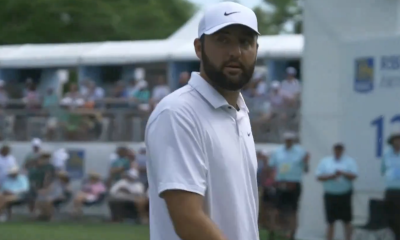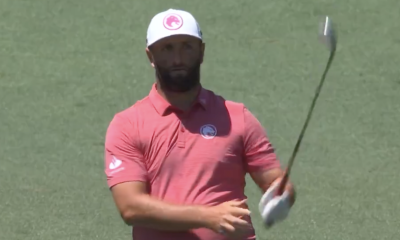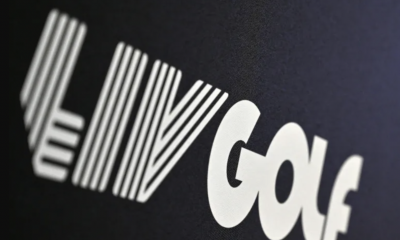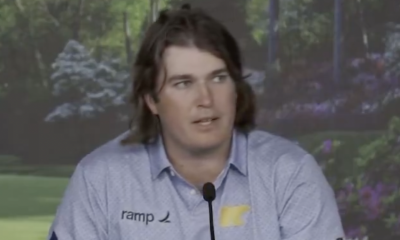Opinion & Analysis
Is competitive golf for you?

Many recreational golfers often wonder if they should dip their toes into the waters of competitive golf. This article will give you an understanding of what it’s like to play under the pressure cooker of a stroke-play event, and offer some ideas on how to pursue an amateur career.
Make no mistake, competitive golf is an entirely different animal from a Sunday morning round with your buddies. There are no gimmies, X’s on the scorecard for bad holes, and certainly no breakfast balls. Every shot carries more significance, and in the back of your head you know that one errant swing could cost you any chances of success.
That being said, it can be extremely fun! Starting an amateur career can open up a whole new dimension of golf for you, and give you an intense focus on what you can do to improve your game.
My Experience
I grew up playing high school golf, junior events, and a bit in college. I have lost count at this point, but I have played well over 100 rounds of tournament golf. Competition was always a mixed bag for me. I had the exhilaration of success, and the awful sinking feeling when I blew my chances of making the cut at the most important tournaments. I was never a standout player, but was good enough to stick around.
After college I took about a 10-year hiatus from tournaments and a couple of years ago I decided it was time to get back into it. I’d like to take you through the process I’ve gone through from finding events, setting goals, and dealing with just how different it is to play golf in a real competitive environment.
Setting Goals
In 2014, my goal was to get my handicap below 1.4 so I could compete in the U.S. Open Qualifier the following year. I had started the year around a 4, so I had some serious work to do. Because my goal was extremely specific, and not completely far-fetched, it helped me focus on what I needed to do to get there.
I took a hard look at my game, and decided that in order to reach that level I needed to put some serious work into both my short game and fixing errant tee shots. More importantly, I needed to play more golf. There is no substitute for improving at this game other than live action.
Sixty rounds later and some serious time spent practicing on the range and in my backyard, I ended the year at a 0.7 handicap. It might not sound like a lot, but moving from a 4 handicap down to almost scratch is a huge jump. There were many bumps along the road, but I kept my focus on the goal and I was happy to get there.
Having the goal of playing in the U.S. Open qualifier is what kept me practicing hard all year, and I strongly believe that it was the main factor for my huge drop in scoring. If you are looking to get into competition I would recommend setting some goals for yourself based on the level of golf you’re looking to compete at. Not all tournaments have such a low handicap requirement, so it’s best to find one that represents a reasonable level that you can achieve. Don’t go thinking you can drop from a 13 handicap down to 2 in six months though!
The Tale of Two Tournaments
Now that I had spent 2014 getting my game in gear, I had registered for the 2015 U.S. Open Qualifier and another amateur event that I found through our local golf association. After a brutal winter that ended late, I only had a few weeks to prepare for the qualifier, which was in May. I continued my work on the range, and tried to play as much as possible leading up to the tournament, and I felt my game was as sharp as it could be.
Since this was my first competitive round in more than 10 years, I tried to be reasonable with my expectations, and I urge you to do the same if you are just starting out. You never really know how your game is going to react in a tournament situation. I told myself that if I broke 80 at the qualifier I would be happy with myself. If I’m being completely honest, all I really wanted to do was not make a fool of myself and get banned from ever trying to qualify again by the USGA!
The day of the tournament I was pretty nervous. I showed up to Bethpage State Park a few hours early, which was probably a huge mistake. After walking around the practice green and the range I could see that the field was a mixture of college players and seasoned pros.
What am I doing here?
My warm-up session was a bit terrifying to be honest with you. After going through my normal routine for about 20 minutes, all of a sudden I started shanking 8-irons. It was like a scene out of Tin Cup. I looked back at my friend who was caddying for me that day, and we both gave each other a look that clearly said, “uh oh.”
After watching player after player bomb 300-yard drives off the tee of the intimidating 450-yard opening hole, I was in full freak-out mode. I was about a 9 out of 10 on the nervous meter.
My first tee shot was horrific, a pathetic duck hook that landed in the worst part of the golf course. Luckily a marshal was able to find my ball in about 2 feet of rough. I pitched out, and somehow managed to make a bogey.
Then something funny happened. All of the nerves went away, and my routine took over. I went on to have a great round. Despite some shaky putting and a double on No. 18, I shot a 76 in difficult conditions. I ended up 63rd out of roughly 120 players. I had finished ahead of some great golfers, and felt pretty good about myself.
I had achieved my goal, and all of the preparation before the tournament had paid off.
What Goes Up Must Come Down
Here’s the thing about competition, and golf in general really: It has a way of humbling you pretty quickly if you get a little too conceited.
My next tournament was a qualifier for a pretty important local amateur event. I knew that I had to shoot roughly 5- or 6-over in order to make the cut, so there was a very specific number in my head beforehand. I had never played the course, but it was only 6,100 yards, and I assumed that it would be no problem to overpower it and make the cut.
Expectations are a funny thing in golf. At the U.S. Open Qualifier I knew I didn’t have a realistic chance of qualifying, and I really had nothing to lose. However, in this tournament I was fully expecting to make the cut.
When you play in a tournament all of your deepest fears as a golfer are exposed. Shots that you aren’t completely confident over all of sudden are magnified 100 times more than a normal round. On the third hole I was faced with a 30-yard bunker shot, which is by far and away the shot that terrifies me the most as a golfer. There was water over the back of the green, and all I could think about was not blading it into the drink.
Well that is exactly what I did, and I made a triple bogey.
It was completely embarrassing because my playing partners were all in line to make routine pars, and they had to wait for me to clean up my mess. There was a terrible sinking feeling walking off that green at 4-over par after only three holes. All of my momentum was completely gone, and the rest of the round was a blur of bogeys, self-doubt and embarrassment. I ended up shooting an 85, and was not even close to the cut line.
At the scorer’s table I couldn’t help but laugh at myself for the way I had felt before the round, and what transgressed on the course. It was only my second tournament back into competitive play, and I realized that I had gotten way ahead of myself. Lesson learned.
It’s a Mixed Bag
So what can you learn from my experience? Well, a few things hopefully. If you are interested in pursuing an amateur career in tournament golf you need to be prepared, and I mean that in a few ways.
- Planning: Make sure you give yourself plenty of time to select the tournaments you want to play in; it could be as much as a year in advance in some cases.
- Preparation: If you are serious about success, your game needs to be ready. Don’t expect to show up to a tournament without having played or practiced much and perform well. Set specific goals that are reasonable and measurable.
- Expectations: Your mind needs to be ready. Tournament golf is nothing like a normal round. There are no safety nets, and if this is a new experience, you need to expect the unexpected. Anything can happen out there, and it’s OK!
What Tournaments Can You Play In?
The first thing you have to do is find actual tournaments to play in. The best place to start is your local golf associations. For example, in the New York Metro area we have the MGA, Long Island Golf Association, and New Jersey Golf Association. They all run a bunch of tournaments for golfers at various levels.
There are also some national resources where you can find events like the Golf Channel Amateur Tour. Amateurgolf.com is also a fantastic resource because it has a searchable database of tournaments.
Each event will have registration guidelines such as age and handicap level. My advice is to pick two or three events on the calendar that you think you want to play in. It’s best to start off slowly if competitive golf is new for you.
Competition can be extremely fun and rewarding. It also can be terrifying and embarrassing. Everyone who has ever competed at any level can attest to this. Dealing with the highs and the lows is part of the deal, but there is no substitute for experience. The more tournaments you play, the better you will be at handling the pressure. Start off slowly, and try to have fun with it.
- LIKE335
- LEGIT41
- WOW13
- LOL4
- IDHT2
- FLOP5
- OB2
- SHANK10
19th Hole
Vincenzi’s LIV Golf Singapore betting preview: Course specialist ready to thrive once again

After another strong showing in Australia, LIV Golf will head to Sentosa Golf Club in Singapore looking to build off of what was undoubtedly their best event to date.
Sentosa Golf Club sits on the southern tip of Singapore and is one of the most beautiful courses in the world. The course is more than just incredible scenically; it was also rated 55th in Golf Digest’s top-100 courses in 2022-2023 and has been consistently regarded as one of the best courses in Asia. Prior to being part of the LIV rotation, the course hosted the Singapore Open every year since 2005.
Sentosa Golf Club is a par 71 measuring 7,406 yards. The course will require precise ball striking and some length off the tee. It’s possible to go low due to the pristine conditions, but there are also plenty of hazards and difficult spots on the course that can bring double bogey into play in a hurry. The Bermudagrass greens are perfectly manicured, and the course has spent millions on the sub-air system to keep the greens rolling fast. I spoke to Asian Tour player, Travis Smyth, who described the greens as “the best [he’s] ever played.”
Davis Love III, who competed in a Singapore Open in 2019, also gushed over the condition of the golf course.
“I love the greens. They are fabulous,” the 21-time PGA Tour winner said.
Love III also spoke about other aspects of the golf course.
“The greens are great; the fairways are perfect. It is a wonderful course, and it’s tricky off the tee.”
“It’s a long golf course, and you get some long iron shots. It takes somebody hitting it great to hit every green even though they are big.”
As Love III said, the course can be difficult off the tee due to the length of the course and the trouble looming around every corner. It will take a terrific ball striking week to win at Sentosa Golf Club.
In his pre-tournament press conference last season, Phil Mickelson echoed many of the same sentiments.
“To play Sentosa effectively, you’re going to have a lot of shots from 160 to 210, a lot of full 6-, 7-, 8-iron shots, and you need to hit those really well and you need to drive the ball well.”
Golfers who excel from tee to green and can dial in their longer irons will have a massive advantage this week.
Stat Leaders at LIV Golf Adelaide:
Fairways Hit
1.) Louis Oosthuizen
2.) Anirban Lahiri
3.) Jon Rahm
4.) Brendan Steele
5.) Cameron Tringale
Greens in Regulation
1.) Brooks Koepka
2.) Brendan Steele
3.) Dean Burmester
4.) Cameron Tringale
5.) Anirban Lahiri
Birdies Made
1.) Brendan Steele
2.) Dean Burmester
3.) Thomas Pieters
4.) Patrick Reed
5.) Carlos Ortiz
LIV Golf Individual Standings:
1.) Joaquin Niemann
2.) Jon Rahm
3.) Dean Burmester
4.) Louis Oosthuizen
5.) Abraham Ancer
LIV Golf Team Standings:
1.) Crushers
2.) Legion XIII
3.) Torque
4.) Stinger GC
5.) Ripper GC
LIV Golf Singapore Picks
Sergio Garcia +3000 (DraftKings)
Sergio Garcia is no stranger to Sentosa Golf Club. The Spaniard won the Singapore Open in 2018 by five strokes and lost in a playoff at LIV Singapore last year to scorching hot Talor Gooch. Looking at the course setup, it’s no surprise that a player like Sergio has played incredible golf here. He’s long off the tee and is one of the better long iron players in the world when he’s in form. Garcia is also statistically a much better putter on Bermudagrass than he is on other putting surfaces. He’s putt extremely well on Sentosa’s incredibly pure green complexes.
This season, Garcia has two runner-up finishes, both of them being playoff losses. Both El Camaleon and Doral are courses he’s had success at in his career. The Spaniard is a player who plays well at his tracks, and Sentosa is one of them. I believe Sergio will get himself in the mix this week. Hopefully the third time is a charm in Singapore.
Paul Casey +3300 (FanDuel)
Paul Casey is in the midst of one of his best seasons in the five years or so. The results recently have been up and down, but he’s shown that when he’s on a golf course that suits his game, he’s amongst the contenders.
This season, Casey has finishes of T5 (LIV Las Vegas), T2 (LIV Hong Kong), and a 6th at the Singapore Classic on the DP World Tour. At his best, the Englishman is one of the best long iron players in the world, which makes him a strong fit for Sentosa. Despite being in poor form last season, he was able to fire a Sunday 63, which shows he can low here at the course.
It’s been three years since Casey has won a tournament (Omega Dubai Desert Classic in 2021), but he’s been one of the top players on LIV this season and I think he can get it done at some point this season.
Mito Pereira +5000 (Bet365)
Since Mito Pereira’s unfortunate demise at the 2022 PGA Championship, he’s been extremely inconsistent. However, over the past few months, the Chilean has played well on the International Series as well as his most recent LIV start. Mito finished 8th at LIV Adelaide, which was his best LIV finish this season.
Last year, Pereira finished 5th at LIV Singapore, shooting fantastic rounds of 67-66-66. It makes sense why Mito would like Sentosa, as preeminent ball strikers tend to rise to the challenge of the golf course. He’s a great long iron player who is long and straight off the tee.
Mito has some experience playing in Asia and is one of the most talented players on LIV who’s yet to get in the winner’s circle. I have questions about whether or not he can come through once in contention, but if he gets there, I’m happy to roll the dice.
Andy Ogletree +15000 (DraftKings)
Andy Ogletree is a player I expected to have a strong 2024 but struggled early in his first full season on LIV. After failing to crack the top-25 in any LIV event this year, the former U.S. Amateur champion finally figured things out, finished in a tie for 3rd at LIV Adelaide.
Ogletree should be incredible comfortable playing in Singapore. He won the International Series Qatar last year and finished T3 at the International Series Singapore. The 26-year-old was arguably the best player on the Asian Tour in 2023 and has been fantastic in the continent over the past 18 months.
If Ogletree has indeed found form, he looks to be an amazing value at triple-digit odds.
- LIKE3
- LEGIT3
- WOW1
- LOL2
- IDHT0
- FLOP2
- OB0
- SHANK0
Opinion & Analysis
Ryan: Lessons from the worst golf instructor in America

In Tampa, there is a golf course that boasts carts that do not work, a water range, and a group of players none of which have any chance to break 80. The course is overseen by a staff of crusty men who have succeeded at nothing in life but ending up at the worst-run course in America. However, this place is no failure. With several other local courses going out of business — and boasting outstanding greens — the place is booked full.
While I came for the great greens, I stayed to watch our resident instructor; a poor-tempered, method teacher who caters to the hopeless. At first, it was simply hilarious. However, after months of listening and watching, something clicked. I realized I had a front-row seat to the worst golf instructor in America.
Here are some of my key takeaways.
Method Teacher
It is widely accepted that there are three types of golf instructors: system teachers, non-system teachers, and method teachers. Method teachers prescribe the same antidote for each student based on a preamble which teachers can learn in a couple day certification.
Method teaching allows anyone to be certified. This process caters to the lowest caliber instructor, creating the illusion of competency. This empowers these underqualified instructors with the moniker of “certified” to prey on the innocent and uninformed.
The Cult of Stack and Jilt
The Stack and Tilt website proudly boasts, “A golfer swings his hands inward in the backswing as opposed to straight back to 1) create power, similar to a field goal kicker moving his leg in an arc and 2) to promote a swing that is in-to-out, which produces a draw (and eliminates a slice).”
Now, let me tell you something, there is this law of the universe which says “energy can either be created or destroyed,” so either these guys are defying physics or they have no idea what they are taking about. Further, the idea that the first move of the backswing determines impact is conjecture with a splash of utter fantasy.
These are the pontifications of a method — a set of prescriptions applied to everyone with the hope of some success through the placebo effect. It is one thing for a naive student to believe, for a golf instructor to drink and then dispel this Kool-Aid is malpractice.
Fooled by Randomness
In flipping a coin, or even a March Madness bet, there is a 50-50 chance of success. In golf, especially for new players, results are asymmetric. Simply put: Anything can happen. The problem is that when bad instructors work with high handicappers, each and every shot gets its own diagnosis and prescription. Soon the student is overwhelmed.
Now here’s the sinister thing: The overwhelming information is by design. In this case, the coach is not trying to make you better, they are trying to make you reliant on them for information. A quasi Stockholm syndrome of codependency.
Practice
One of the most important scientists of the 20th century was Ivan Pavlov. As you might recall, he found that animals, including humans, could be conditioned into biological responses. In golf, the idea of practice has made millions of hackers salivate that they are one lesson or practice session from “the secret.”
Sunk Cost
The idea for the worst golf instructor is to create control and dependency so that clients ignore the sunk cost of not getting better. Instead, they are held hostage by the idea that they are one lesson or tip away from unlocking their potential.
Cliches
Cliches have the effect of terminating thoughts. However, they are the weapon of choice for this instructor. Add some hyperbole and students actually get no information. As a result, these players couldn’t play golf. When they did, they had no real scheme. With no idea what they are doing, they would descend into a spiral of no idea what to do, bad results, lower confidence, and running back to the lesson tee from more cliches.
The fact is that poor instruction is about conditioning players to become reliant members of your cult. To take away autonomy. To use practice as a form of control. To sell more golf lessons not by making people better but through the guise that without the teacher, the student can never reach their full potential. All under the umbrella of being “certified” (in a 2-day course!) and a melee of cliches.
This of course is not just happening at my muni but is a systemic problem around the country and around the world, the consequences of which are giving people a great reason to stop playing golf. But hey, at least it’s selling a lot of golf balls…
- LIKE17
- LEGIT2
- WOW0
- LOL4
- IDHT1
- FLOP2
- OB1
- SHANK21
19th Hole
Vincenzi’s 2024 Zurich Classic of New Orleans betting preview

The PGA TOUR heads to New Orleans to play the 2023 Zurich Classic of New Orleans. In a welcome change from the usual stroke play, the Zurich Classic is a team event. On Thursday and Saturday, the teams play best ball, and on Friday and Sunday the teams play alternate shot.
TPC Louisiana is a par 72 that measures 7,425 yards. The course features some short par 4s and plenty of water and bunkers, which makes for a lot of exciting risk/reward scenarios for competitors. Pete Dye designed the course in 2004 specifically for the Zurich Classic, although the event didn’t make its debut until 2007 because of Hurricane Katrina.
Coming off of the Masters and a signature event in consecutive weeks, the field this week is a step down, and understandably so. Many of the world’s top players will be using this time to rest after a busy stretch.
However, there are some interesting teams this season with some stars making surprise appearances in the team event. Some notable teams include Patrick Cantlay and Xander Schauffele, Rory McIlroy and Shane Lowry, Collin Morikawa and Kurt Kitayama, Will Zalatoris and Sahith Theegala as well as a few Canadian teams, Nick Taylor and Adam Hadwin and Taylor Pendrith and Corey Conners.
Past Winners at TPC Louisiana
- 2023: Riley/Hardy (-30)
- 2022: Cantlay/Schauffele (-29)
- 2021: Leishman/Smith (-20)
- 2019: Palmer/Rahm (-26)
- 2018: Horschel/Piercy (-22)
- 2017: Blixt/Smith (-27)
2024 Zurich Classic of New Orleans Picks
Tom Hoge/Maverick McNealy +2500 (DraftKings)
Tom Hoge is coming off of a solid T18 finish at the RBC Heritage and finished T13 at last year’s Zurich Classic alongside Harris English.
This season, Hoge is having one of his best years on Tour in terms of Strokes Gained: Approach. In his last 24 rounds, the only player to top him on the category is Scottie Scheffler. Hoge has been solid on Pete Dye designs, ranking 28th in the field over his past 36 rounds.
McNealy is also having a solid season. He’s finished T6 at the Waste Management Phoenix Open and T9 at the PLAYERS Championship. He recently started working with world renowned swing coach, Butch Harmon, and its seemingly paid dividends in 2024.
Keith Mitchell/Joel Dahmen +4000 (DraftKings)
Keith Mitchell is having a fantastic season, finishing in the top-20 of five of his past seven starts on Tour. Most recently, Mitchell finished T14 at the Valero Texas Open and gained a whopping 6.0 strokes off the tee. He finished 6th at last year’s Zurich Classic.
Joel Dahmen is having a resurgent year and has been dialed in with his irons. He also has a T11 finish at the PLAYERS Championship at TPC Sawgrass which is another Pete Dye track. With Mitchell’s length and Dahmen’s ability to put it close with his short irons, the Mitchell/Dahmen combination will be dangerous this week.
Taylor Moore/Matt NeSmith +6500 (DraftKings)
Taylor Moore has quickly developed into one of the more consistent players on Tour. He’s finished in the top-20 in three of his past four starts, including a very impressive showing at The Masters, finishing T20. He’s also finished T4 at this event in consecutive seasons alongside Matt NeSmith.
NeSmith isn’t having a great 2024, but has seemed to elevate his game in this format. He finished T26 at Pete Dye’s TPC Sawgrass, which gives the 30-year-old something to build off of. NeSmith is also a great putter on Bermudagrass, which could help elevate Moore’s ball striking prowess.
- LIKE8
- LEGIT3
- WOW1
- LOL1
- IDHT0
- FLOP3
- OB1
- SHANK2
-

 19th Hole2 weeks ago
19th Hole2 weeks agoJustin Thomas on the equipment choice of Scottie Scheffler that he thinks is ‘weird’
-

 19th Hole2 weeks ago
19th Hole2 weeks ago‘Absolutely crazy’ – Major champ lays into Patrick Cantlay over his decision on final hole of RBC Heritage
-

 19th Hole3 weeks ago
19th Hole3 weeks agoTwo star names reportedly blanked Jon Rahm all week at the Masters
-

 19th Hole3 weeks ago
19th Hole3 weeks agoReport: LIV Golf identifies latest star name they hope to sign to breakaway tour
-

 19th Hole3 weeks ago
19th Hole3 weeks agoNeal Shipley presser ends in awkward fashion after reporter claims Tiger handed him note on 8th fairway
-

 19th Hole2 weeks ago
19th Hole2 weeks agoBrandel Chamblee has ‘no doubt’ who started the McIlroy/LIV rumor and why
-

 19th Hole1 week ago
19th Hole1 week agoLET pro gives detailed financial breakdown of first week on tour…and the net result may shock you
-

 Equipment3 weeks ago
Equipment3 weeks agoJason Day on his recent switch into Srixon ZX5 and ZX7 Mk II irons


















mizuno29
Feb 24, 2016 at 8:48 am
Excellent article!!!!!!!!!!!!!
Jon Sherman
Feb 24, 2016 at 8:57 am
thank you 🙂
John (ChipNRun)
Feb 23, 2016 at 11:28 am
Well written article. “Facts” are all there and the story flows well too.
The article brought back lessons of summer past, when I played in the local amateur circuit tournaments for the first time. The point about “all of your deepest fears as a golfer are exposed” is all too true. In half the rounds I had a blow-up hole (my deepest fear) where I mishit a shot… overcorrected.. and mishit again… the longest walk in golf is going up to green to try and sink a 3-foot putt to salvage a 10.
For those entering competitive golf, chalk up the first season to just learning how to play in tournament conditions. There’s a lot of mental trash that bothers you in year one – it goes away. One thing: ask the course marshal pre-round about any unusual local rules or conditions, and how to handle them. I got several bits of bad rules advice from am circuit veterans (it ended up costing me strokes when I could have gotten relief). Make sure you review the rules of golf before you enter the tournaments.
The good thing is, I got to play some fairly big name courses, and post my own score. The problem with scrambles is you get to play top courses, but you don’t get your OWN score. One such course was Glen Echo CC here in St. Louis. Build by Old Tom Morris protege Jim Foulis, it hosted the only Olympics golf tournament back in 1904. In the championship match, Canadian star George Lyon defeated defending US Amateur champ Chandler Egan 3-and-2. No. 15 tee has a plaque commemorating this fateful hole, in which Egan pulled his tee shot into the lake and pretty much lost the match. (Small victories: I put my drive into the fairway).
Jon Sherman
Feb 24, 2016 at 8:57 am
thanks John!! Appreciate you taking the time to read it
Jp
Feb 23, 2016 at 8:09 am
Great article. I love competing now. It’s a great feeling and motivator to overcome the mental as well as physical. Great journey. I’m a 3 now and if I get down to a 1 I’ll go from winning occasionally to winning a lot in the local matches. Can’t wait !
gary
Feb 22, 2016 at 6:28 pm
Playing tournament golf will improve your course management and the way you putt. When playing with your buddies it is just hit driver and get the putt to the hole. Who wants to hear “nice putt Alice” Tournament golf is a different animal. Every shot counts. Every shot needs 100% total commitment. Problem is everyone has a comfort zone and the guy that shot 66 couldn’t handle the round of his life. My comfort zone is even so if I shoot -2 on the front pretty much guarantee you I’ll find a way to shoot 2 over on the back. If I’m +3 after nine I’ll find a way back to even par. Golf is a funny game. Tournament golf is a serious game.
Scott
Feb 18, 2016 at 10:49 am
Another fun read on trying to play tournament golf is:
Paper Tiger: An Obsessed Golfer’s Quest to Play with the Pros
Book by Tom Coyne
viking62
Feb 18, 2016 at 8:31 am
I can relate a little bit with respect to expectations. I took up the game late in life and in my mid 40s decided to try tourneys – my first tournament (Ont Public Player) but the field was flighted so I was in the B group – I had no expectations – didn’t really even know the rules – made the cut and finished 7th – I was thrilled.
The next year my handicap improved and I was in the A flight – I looked at the handicaps and figured I was the worst player there so figured I’d never make the cut – I finished 4th – actually had a chance to win but tripled the 17th.
The next year brimming with confidence I qualified for the Ontario Mid Am – went there expecting to do well – got there and immediately felt inadequate – was instantly horrible – hooked first drive 75 yards left – played a provisional when it was red staked and was forced to play my provish – double, followed by a triple and I felt like an ass.
I’ve honestly never hit the ball as well as I did leading up to that tourney accept when playing alone or with close friends. Expectations seem to have overwhelmed me.
Ron
Feb 18, 2016 at 12:40 am
Jon, Thanks for telling your tournament experience – and to the rest of you who also added your stories. Here’s mine: I played young (junior golf, HS, college) without ever being particularly good or competitive. After a hiatus from golf for well over three decades as real life took over, I started playing recreationally again. After retiring I started playing a lot, my index dropped to the low-to-mid single digits, so at 72 decided to enter our county senior am tournament. I knew I couldn’t win, of course, I was in grad school when some of these guys were born – and I hadn’t played in an actual tournament since my senior year in college. But it gave me a great excuse to work on my game with some purpose. I shot 75 in round one – the same score I shot on the final day of that intercollegiate championship fifty years earlier. So I told my kid my half-century tournament average was 75. In what other sport is something like that even possible?
Matt
Feb 17, 2016 at 8:03 pm
Jon,
Really enjoyed the article. Can relate to the grind from a 4 to a scratch. Even after getting to around a .4 handicap, it was very difficult to stay at that level in college with less time to play. My hope is to play enough throughout my twenties to avoid that drop to a mid level handicap.
Our company is looking to keep players from having that 10 year lull you had. That lull certainly makes it difficult to stay sharp and people in their twenties often miss out on competition due to time or cost. You mentioned the state association and Golf Channel Am Tour as great outlets for competitive rounds which I totally agree with. For those 18-34 year old readers, they should also consider our Nextgengolf City Tour events for younger players across the country. If this was around when you were finishing your college days, you would have been a great fit to compete while still balancing your busy everyday life with kids and a job. Hope this helps supplement your article with some other ways golfers can stay sharp and have fun!
– Matt
Jon Sherman
Feb 18, 2016 at 12:47 pm
Thanks for chiming in Matt. I absolutely would have loved to play in these events when I was younger! That’s really a great idea for that age group because the competitive juices are still flowing pretty strongly, it’s just hard to find an outlet for them sometimes with golf.
ken
Feb 17, 2016 at 7:27 pm
LOL…..our tour is flighted. So the expectation that the other people in my group have done the same thing or worse, is highly likely.
I find the ball and hit it again. What are ya gonna do? Stress? Its a GAME..I have played in a few “open” tournaments where the USGA index is used to come to a Net Score. In those events, i have found there are lots of great guys. And of course there are guys that are “Living the dream”. These guys tens to act like guys like me aren’t worthy of the same turfgrass as they.
That is until they realize i play just as fast or faster than they. One thing I have noticed about playing against low handicappers that are grinders and real serious is if I am waiting on them to hit their next shot….It bugs the crap out of them…Worse yet…..Hit it inside of them from the fairway or a par three……LOL…makes ’em NUTS
McGruff
Feb 24, 2016 at 9:54 pm
No one cares how fast or bad you play.
James
Feb 17, 2016 at 2:52 pm
Great article Jon. You’ve motivated me to get my butt into gear to shave 3.8 off my handicap to qualify for my club’s major tourney each year. Coming from athletics background I can add that nerves are cruel mistress that can strike you down and ruin years of prep for an event. Ask any Olympic sprinter you train for four years and have one crack at getting it right…..at least in golf we have the next shot!
John
Feb 17, 2016 at 2:23 pm
Another thing to remember that will definitely help…THE OTHER GUYS DON’T CARE! It used to really affect me when I would hit a bad shot and do something dumb because I thought everyone else was thinking about it as much as I was. I finally realized that many of the guys I played with hit their share of bad shots, and while I might have felt a bit sorry for them for a split second, I was focused on my own game and didn’t really give them a second thought, and I’m sure they did the same thing when I hit a bad shot. That took a lot of the pressure off and really helped my game.
Great article!
Scott
Feb 18, 2016 at 10:40 am
+1
MIKAH
Feb 17, 2016 at 2:10 pm
You wasted so much time getting to scratch. Everyone on WRX knows is that all you need to do to get to scratch is buy a set of blades! DUH!!
Luis
Feb 17, 2016 at 2:02 pm
Jon
Can you provide a sense of how much you played/practiced in 2014 to get yourself ready? 2-3 games a week? practice 5 days a week? what about conditioning, how were you able to squeeze that in?
thank you – great post!
Luis
Luis
Jon Sherman
Feb 18, 2016 at 9:13 am
I tried to get about 2-3 solid practice sessions in a week. A lot of that was concentrated on honing in my wedge distances, and improving my putting. My game inside 100 yards was one of my weak links. On top of that I would say I averaged about 2 rounds a week for a 6 month period. Some weeks I was able to play and practice more, and others less. It’s obviously hard to squeeze golf in with family and work obligations. I will say I have an amazing wife who is extremely supportive!!!
M-Herd4
Feb 17, 2016 at 11:12 am
Great article Jon! I can completely relate to overwhelming nerves. I played in a few tournaments on my highschool team and shot a 108 in the last one I played. Took a 14 on the 2nd hole of the day! I’m 46 now and played in a NY State Mid-Am qualifier a few years ago and scraped it around all day for a 92. I love the thought of playing competitively but my nerves take over to the point where I completely lose my focus and thought process. This game can mentally scar you for sure. I love the game though and maybe some day I’ll find the courage again to try my hand at some competition.
OH
Feb 17, 2016 at 10:29 am
Great article! I’ve been playing on the GC Am Tour for a couple years and love playing competitive golf. I’ll never qualify for the US Open but it’s still fun to get out there and compete. There are a lot of great options available for amateurs today at some incredible courses around the country. I think the GCAT is a solid option for a broad range of handicaps to “dip their toe” into competitive golf. Just remember, though, you aren’t playing for a paycheck so keep the ego in check and have fun. I’ve seen way too many guys get all worked up like they are playing a Monday qualifier for the Open.
Rob
Feb 17, 2016 at 10:01 am
I’m don’t want to sound demeaning, as I play a lot of amateur tournaments at both the state and national lever, but why would you spend $150 to sign up for US OPEN local qualifying with the goal to only break 80? Seems like a bit of a waste of money. Or were your goal really to qualify?
Jon Sherman
Feb 17, 2016 at 10:23 am
Overall it was something to motivate me to improve my game. I always wanted to play in a U.S. Open qualifier. Was I capable of actually making it out of that first round? Absolutely. I actually hit 14 greens that day, and anyone who was at -1 got in the playoff for what I believe was 8 spots. So in an alternate universe where I was putting well that day I certainly had a shot (easier said than done). That being said, I tried to be reasonable with myself. If I went in there thinking I was going to qualify I don’t think I would have played as well. In the future I am just going to be playing in local events, and probably won’t play many USGA tournaments.
Nick
Feb 17, 2016 at 4:19 pm
These qualifiers are often at nice golf courses and they allow a practice round. Heck, that’s a bargain for two rounds at most of the qualifying sites in my state tournaments. He shot 76 in a U.S. open qualifier, that’s more than commendable considering his time away from tournament play.
ken
Feb 17, 2016 at 7:30 pm
I know……The type of tournaments Jon is playing are under conditions as tough as they can get( unless it is a USGA event) for Amateur golfers.
I think going out and breaking 80 on a relatively difficult course while playing among golfers that can shoot lo 70’s or even high 60’s is good experience.
If not to win, but to prove to one’s self they can do it.
Scott
Feb 18, 2016 at 10:46 am
I have to agree with the responses indicating that it is $150 well spent. No one wants to embarrass themselves, but playing for something cool on a great track is well worth $150.
Simz
Feb 17, 2016 at 3:35 am
Thanks for this! Much appreciated.
I am looking to play more competitive golf this year, starting with the Club Champs. I wont pursue an amateur career, as I’m way over the hill…but definately more tournaments. It’s pretty difficult with a full time job & family, and I squeeze in all the practise & lessons I can.
Thanks again & all the best in future tournaments!
Jon Sherman
Feb 17, 2016 at 8:49 am
thank you! It’s definitely a time-consuming endeavor. I am only planning on playing 2-3 tournaments this year as we have two young children. Luckily I have enough space to fit a practice net in my basement so I can get in some practice sessions here and there. Definitely need to get creative with it when you’re short on time.
Other Paul
Feb 17, 2016 at 12:32 am
I have had such a great virtual golf season this winter and improved so much (controlling a hook took time) that i really want to play amateur golf. So this article was a great read for me. Just cant wait for the snow to melt. Also I found a pro that is willing to take me under his wing (He is playing competitive golf already and doing well).
Jon Sherman
Feb 17, 2016 at 8:52 am
If your goal is to play more competitive golf, I think it’s important to work with a pro who has tournament experience. Coaching is just as important as instruction when gearing up to play in some events.
Andrew
Feb 16, 2016 at 8:29 pm
Unusual to have unanimous consent on a WRX article – I will add to it: great article both personal and informative. Many thanks Jon!!!
Jon Sherman
Feb 17, 2016 at 8:47 am
thanks Andrew! glad people are enjoying the read
dwc
Feb 16, 2016 at 7:33 pm
Not just a great article but do yourself a big favor and check out the author’s website “Practical Golf”. I did so this morning. It contains a wealth of great information including tips and reviews. Definitely one of the best golf sites I have used. Thanks Jon!
Jon Sherman
Feb 16, 2016 at 7:54 pm
thanks for checking out the site!
Johnny
Feb 16, 2016 at 2:33 pm
Great Article Jon, it was a pleasure to read! Playing in tournaments is where you really develop a passion for the game. I believe the only way to truly develop the game is to get more people (especially juniors) involved in competitive golf at whatever level. Tournament golf is the most rewarding and the most soul crushing activity that you can take part in. A couple years back in our club championship I shot 66, 86 making an 8 on the last hole to lose by 1 shot. Brutal, but I still love it! Can’t wait till this white stuff goes away, and I can start grinding to get my game ready for this year.
Jon Sherman
Feb 16, 2016 at 3:17 pm
thanks Johnny, glad you enjoyed the read. 66-86 is certainly a hard pill to swallow, but it keeps you coming back for more!
Ronald Montesano
Feb 16, 2016 at 4:43 pm
It does? Maybe him, but I know fellows who would have broken all their clubs, torched their bag and gone to a monastery to pray for clarity. Johnny, you are more man than many men. Any success stories in subsequent club championships?
Jon Sherman
Feb 16, 2016 at 5:06 pm
haha I guess I was thinking about that opening round 66. John does certainly have resolve for continuing on after heartbreak like that.
Alex
Feb 17, 2016 at 9:23 am
This is what competition is about. Especially golf. You have awful days, but you always believe the next will be a brilliant round. Last year I only won our Fourball Match Play competition, got two runner-ups in stroke play and played all year round. Had some terrible rounds, a subpar round and some good scores in the wind. Playing gets to to accept the bad days and get over.
Johnny
Feb 17, 2016 at 9:57 am
That 86 came thanks to strong wind mixed with a lot of nerves. I didn’t torch my bag or brake all my clubs, but I had to search for clarity in a bottle of Johnny Walker that night. Unfortunately, because of work commitments I was unable to play in the club championship last year, so I missed my chance at revenge. Hopefully I will get the chance this year. I live in Germany, and over here the opportunity for competitive events is endless. Each club has a team and the team travels and plays all the clubs in the area. Also, at least a couple times a month there are stable ford events. I did my fair share of winning last year, but nothing would be sweeter than lifting that club championship trophy up this year.
Alex
Feb 16, 2016 at 2:11 pm
In my country we play tournament golf every weekend. Club competitions, Open tourneys, Match play championships. I don’t play that much these days but I still love tournament golf so there’s a bunch of us who used to compete a lot when we were kids and we really enjoy tournament golf.
We don’t have a lot of time to play but we all have some short focus-oriented practice sessions. Competitive golf is totally addictive and we all want to play our best.
Cliff
Feb 16, 2016 at 12:46 pm
Not sure what it is but I seem to play better golf in tournaments. Maybe my decision making is better. Once in a tournament I topped my driver on the first hole. Only used driver 2 times that day.
Erik
Feb 16, 2016 at 10:01 am
I’ve played in “hundreds” of tournaments myself, starting in high school, college, USGA, etc. The big factor for me was once I got over being “embarrassed” by my bad shots I had nothing to lose. Who cares if you skull one over the green, every player at this level should be good and have enough respect to realize that this happens to everyone. Just as in life, it only matters how you react to that bad shot going forward. Are you going to let it mentally end your round, or are you going to let it go and move on to the next shot.
Jon Sherman
Feb 16, 2016 at 10:14 am
I think this is an important point for most golfers to take note of. EVERYONE who has played tournament golf has had moments that are completely embarrassing. You may have had a great start, and are settling into your round, then all of a sudden you make a terrible swing that rocks you to your core. Being able to deal with that moment is the hardest thing to do in competition, and takes a ton of experience to overcome.
Erik
Feb 16, 2016 at 10:48 am
Hole 1 2 3 4 5 6 7 8 9 10 11 12 13 14 15 16
Par 4 5 4 4 3 5 4 3 4 4 4 3 4 5 4 3
RD 3 3 4 4 3 5 4 3 4 4 4 4 4 6 4 4
17 18 Tot
Par 5 4 72
7 5 75 +
Do you mean something like this Jon? 🙂 -3 after 2, finish +5 over the last 5 holes, shoot a 75 and miss the cut by 1.
Jon Sherman
Feb 16, 2016 at 11:30 am
ugh, I know that feeling. One moment I will never forget is making bogey from 100 yards out in the middle of the fairway on the last hole of my final high school tournament. Missed the cut by one stroke.
15+ years later and it still stings!
Dan
Feb 16, 2016 at 9:52 am
This honestly might be my favorite GolfWRX article ever. Loved reading the 1st hand experiences. Great advice.
Jon Sherman
Feb 16, 2016 at 10:11 am
thanks for the kind words Dan, glad you liked it!
Tom Allinder
Feb 23, 2016 at 9:41 pm
Dan, I agree. Best article ever on GolfWRX.
Ryan
Feb 16, 2016 at 8:44 am
A great start for many players is amateurgolftour.net – the Golfweek-sponsored amateur tour. Last I checked there were 44 tours nationwide, mostly East of the Mississippi. Ability ranges from Champ Flight (3hdcp and better) to D flight (19+). No, I don’t work for the tour, but I do play on it. Getting 25+ competitive rounds a year is very helpful and takes the 9 out of 10 nervousness down several notches. I play it for fun, for gift card money to buy golf stuff (total club ho here) and as warm-ups for local and state amateur events.
Nick
Feb 16, 2016 at 8:12 am
I would say that I think you can almost practice too much to where you play poorly in an event. I think that happening to me one year really should me how to always take a relaxed approach into tournaments. But the realistic expectations are a good reminder. I have played better and won tournaments when I didn’t really have many expectations. It relaxes you and allows you to play more naturally.